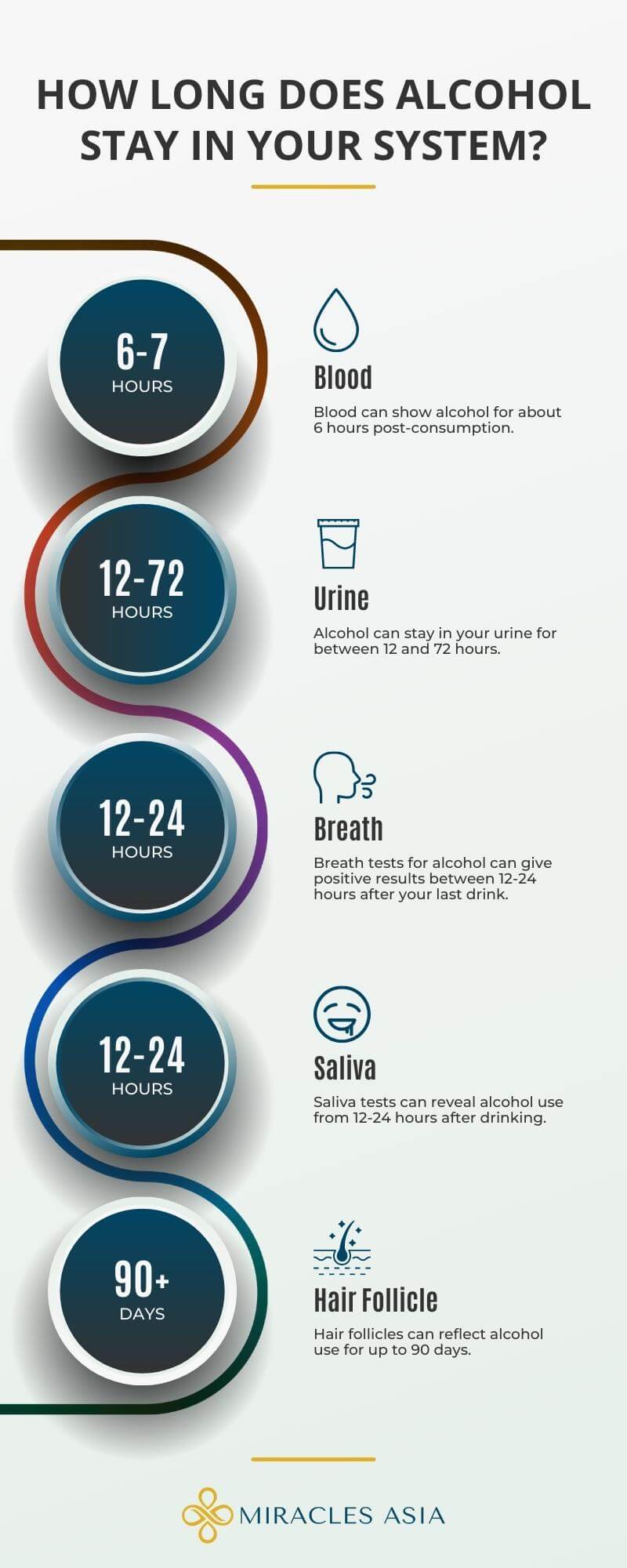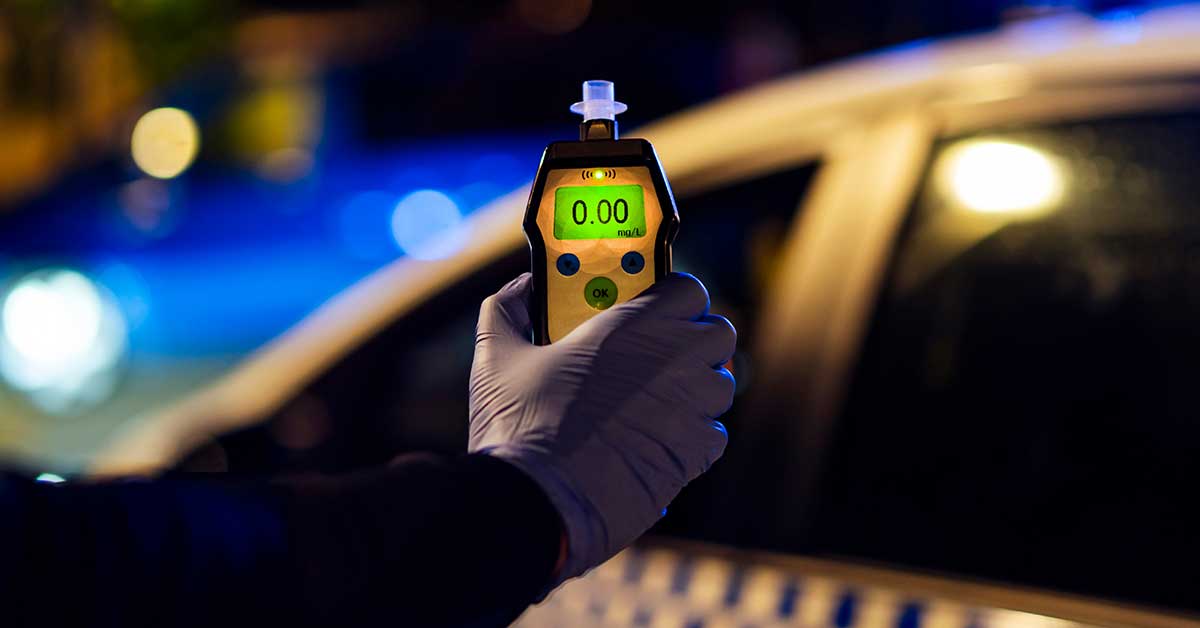How long does it take for alcohol to leave your system? That's a question we've all asked ourselves at least once in our lifetime.
Whether you must drive the next day or have other chores that require you to be sober, calculating how much alcohol you can drink while on your night out with friends becomes essential. Of course, avoiding drinking in such circumstances would always be best. However, if you can't do that, you need to know at least when to finish your drinking for the alcohol to leave your system by then.
The issue is that it's not a straightforward question to answer. How fast your body metabolizes alcohol depends on numerous factors, such as age, the type of alcohol you drink, gender, etc.
In today's guide, we'll explain:
- how long does alcohol stay in your blood, breath, saliva, urine, and hair;
- what is BAC, and how it's used to measure one's alcohol concentration within a body;
- what factors affect how a person's body processes alcohol;
- how fast it takes for a person to sober up;
- and the potential worrying signs of alcohol abuse and addiction.
How Long Does It Take Alcohol to Leave Your System?
How long the alcohol stays in your system will depend on numerous different factors, such as your metabolism, the type of alcohol you drink, and how much alcohol you consume. That time will also vary depending on the test performed to detect alcohol.
On average, alcohol can stay in your system for:
- Up to 6 hours in blood;
- Between 12-72 hours in urine;
- Between 12-24 hours in breath;
- Between 12-24 hours in saliva;
- Up to 90 days in the hair follicle.

How to Measure How Much Alcohol Is In Your System?
Alcohol tests measure alcohol content based on the breath/blood alcohol concentration (BAC) levels. What's important to understand is that BAC is not the total amount of alcohol consumed. Essentially, it shows how much ethanol is in 100 milliliters of blood or 210 milliliters of breath.
However, blood alcohol content isn't only restricted to breath and blood tests. Saliva, hair, and urine tests also use this measure. BAC is displayed as a decimal, where, on average, one standard drink increases BAC levels by 0.02 during the 45-60 minutes it takes for a human body to absorb alcohol.
What is a standard drink? According to the National Institute on Alcohol Abuse and Alcoholism, a standard drink is the equivalent to:
- 12 ounces of regular beer of approximately 5% alcohol;
- 5 ounces of wine of approximately 12%:
- 1.5 ounces of distilled spirits of about 40% alcohol.
How Fast Does Alcohol Kick In?
As covered, it takes around 60 minutes for an average person to absorb a standard alcoholic drink, with BAC reducing approximately by 0.16 every hour. However, you can start feeling the effects of alcohol even within several minutes of having a drink, with an average time being anything between 15-45 minutes.
That time will depend heavily on the type of beverage your drink, whether you drink on an empty stomach, gender, age, and drinking habits.
For instance, since beer and wine have a lower alcohol content than distilled spirits, you're likely to feel their effects slower when compared to stronger alcoholic beverages, such as rum, vodka, or whisky.
Your drinking habits will also affect how fast you can feel the effects of alcohol. For instance, if you engage in binge drinking (excessive alcohol consumption), your BAC will increase by 0.08 on average as opposed to standard 0.02.
How to know if you're drunk? The most common signs of being drunk include slurred speech, lack of coordination, difficulty concentrating, and problems remembering things.
Too much alcohol can also lead to alcohol poisoning, which can manifest itself in vomiting, seizures, trouble breathing, slowed heart rate, confusion, or loss of consciousness. In extreme situations, an alcohol overdose can even be fatal.
How Does Your Body Metabolize Alcohol?
Once consumed, alcohol enters the bloodstream through the stomach and small intestine. From there, it's transported across the body and to the brain.
Then, the body, mainly the liver, breaks down alcohol into two primary enzymes - alcohol dehydrogenase (ADH) and aldehyde dehydrogenase (ALDH). The remaining alcohol that isn't metabolized is then eliminated through urine and breath.
As for how fast your body metabolizes alcohol, this will depend on numerous factors.
What Impacts Your Alcohol Metabolism?
What many people often don't understand is that how long alcohol stays in the system doesn't solely depend on how much they drank.
For instance, suppose you and your friend drank the same amount of alcohol last night. You both take a breath test, and while you still have some alcohol remaining in your system, your friend has a BAC of round 0.
That's because how fast your body processes alcohol varies depending on several factors. Namely:
- Gender. In general, women process alcohol slower than men. That's because, biologically, women have a higher body percentage of fat and a lower percentage of water in their bodies than men. And while this isn't the case for everyone, it does affect how fast the alcohol is processed.
- Weight and body composition. In most instances, the less the person weighs and the smaller their body size, the less body water they have, meaning they can feel the effects of alcohol much faster than those of bigger size and weight, even when drinking the same amount.
- Food. Since alcohol is absorbed in your digestive tract, the less you eat, the faster your body absorbs and processes it. However, while it does make alcohol stay in your system for a shorter period, it also increases the unpleasant effects of drinking, such as dizziness, nausea, or vomiting.
- Medications. Some medications and drugs, such as painkillers or antidepressants, can affect how fast your body processes alcohol. Benzodiazepines or opiates, for instance, can increase the effects of alcohol, so be sure to consult your doctor before drinking alcohol while using medications.
- Individual tolerance. You can develop a tolerance for alcohol when your body gets used to the substance over time. For the tolerance to develop, you'd need to use alcohol frequently. Once that happens, it will take you longer to experience the effects of alcohol.
How Fast Does It Take to Sober Up?
A body can eliminate 0.0015 grams of alcohol per deciliter of blood per hour. Put simply, it takes about one hour for a standard drink to wear off. Again this will depend on the factors we've already discussed, such as your body weight, biological sex, etc.
According to the Southern Illinois University Student Health Services, it takes around 2.5 hours for a person with a BAC level of 0.04 to sober up. The amount of time then rises respectively depending on the blood alcohol concentration level - 5 hours for a BAC of 0.08, 6.25 hours for a BAC of 0.1, and even up to 12.5 hours for a BAC of 0.2.
Also, remember that sobering up doesn't indicate your body has eliminated alcohol from your body. As explained, standard alcohol tests detect alcohol even up to 24 hours after finishing your last drink.
Also, while we're at it, is it possible to sober up faster?
Unfortunately, the answer is no. It's a popular misconception that exercising, drinking coffee, taking a cold shower, or vomiting can help eliminate alcohol faster. That's not true, though. While these can help ease off the effects of a hangover, they won't help your body process alcohol faster.
Another popular method is to keep drinking water when using alcohol. Again, this won't help your body sober up quicker. What it will do, however, is help you wake up feeling better the next day.
There's no way to sober up faster, though. You just need to wait it out.
When to Know You Might've Developed an Alcohol Addiction?
So yes, how fast alcohol is eliminated from your system depends on numerous factors. One of them is how you use alcohol. As covered, the more you drink, the higher your tolerance becomes, meaning you need to drink more to achieve the desired effects. This can quickly get out of control, becoming alcohol abuse and, eventually, a fully-fledged alcohol use disorder (AUD), aka alcohol addiction.
When that happens, the only solution is to seek professional help. Otherwise, substance abuse and addiction can lead to severe short and long-term physical and mental health issues, such as liver failure, cardiovascular problems, depression, or anxiety.
As for when to know when you or the person you know might've developed an alcohol addiction, keep an eye out for the following signs:
- Engaging in unhealthy drinking patterns, e.g., binge drinking or drinking alone;
- Hiding your drinking from family and friends;
- Continuing to drink despite it affecting your job responsibilities and social relationships;
- Feeling substantial alcohol cravings when not drinking;
- Building up a high alcohol tolerance leading to excessive drinking and life-threatening alcohol poisoning and overdose;
- Experiencing severe alcohol withdrawal symptoms, such as seizures, mood swings, sweating, nausea, migraines, etc;
- Being unable to stop drinking despite trying to quit;
- Putting yourself in dangerous situations under the influence, e.g., drunk driving, swimming, hiking, etc.
How Miracles Asia Can Help
If you worry your drinking has become a problem you can no more handle yourself, you'll need to find a place where you can find the help and support needed to regain control over your life. The best solution is to seek rehab overseas.
Why? Because it offers privacy and a top-quality level of treatment for a fraction of the price charged by Western facilities. And here's where Miracles Asia comes in.
As the #1 Rehab Center in Thailand, Miracles Asia provides people struggling with alcohol addiction with high-quality treatment options. Our alcohol addiction rehab & treatment program combines the best addiction treatment techniques, providing each patient with an individual program tailored to their specific case.
The program will start with a medically supervised detoxification process, during which we ensure alcohol is fully eliminated from your system without the risk of withdrawal symptoms damaging your health or threatening your life. From then, you will proceed with your treatment program, which will likely include therapy sessions, exercise, and group counseling.
All this while you stay in our facility on the beautiful and tranquil island of Phuket in Thailand, free of triggers and stressors but with access to multiple amenities, such as swimming pools, yoga studios, massage studios, and your private room.
Key Takeaways
As you can see, answering how long alcohol stays in your system isn't straightforward. For instance, alcohol can stay in the blood for up to six hours, whereas breath, urine, and saliva tests detect alcohol even within 24 hours of finishing your last drink.
However, it all depends on numerous factors, such as the amount of alcohol drank, its type, and whether you ate anything before drinking. It will also depend on biological factors, such as gender, age, weight, and size.
Long story short, if you have any chores or plans that require you to be sober the next day, it's best to avoid drinking entirely. It's also important to pay attention to any worrying signs of alcohol abuse and addiction.
Frequent drinking builds up your alcohol tolerance, requiring you to drink more to achieve the desired effects. This can quickly get out of hand, especially if you struggle with mental health problems or have a family history of addiction.
If you believe your drinking has become a problem you're unable to handle yourself, contact Miracles Asia's team today. Don't wait until it's too late, and remember that admitting you may have an alcohol problem is the first step toward recovery.







